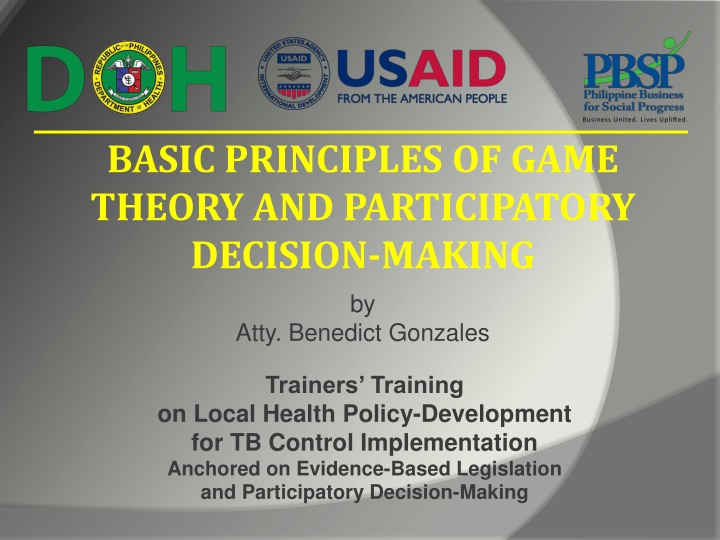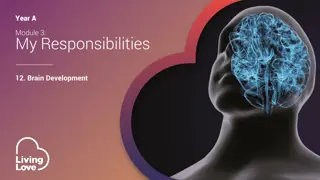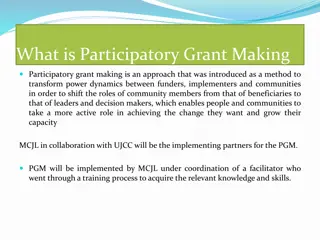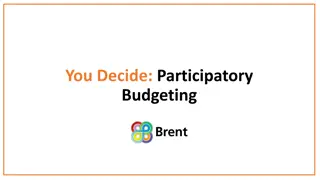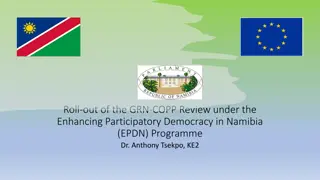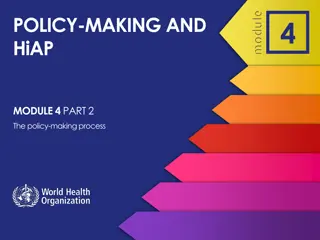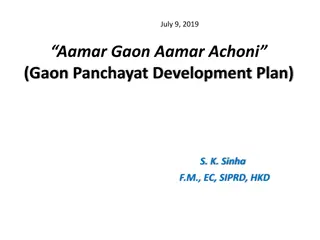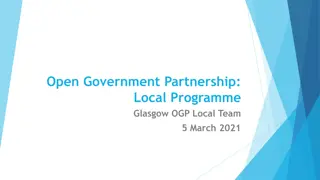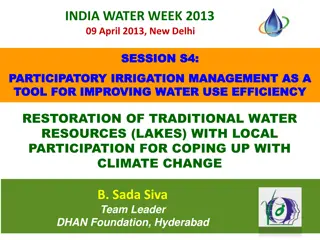Principles of Participatory Decision-Making in Local Health Policy Development
Participatory decision-making involves giving stakeholders a voice in interventions, welcoming diverse perspectives, and avoiding domination by any individual or group. Challenges such as excluding certain groups or rubber-stamping ideas need to be addressed to ensure a truly participatory process. The term "participatory" signifies active contribution from all participants, not just seeking opinions for formality.
Download Presentation

Please find below an Image/Link to download the presentation.
The content on the website is provided AS IS for your information and personal use only. It may not be sold, licensed, or shared on other websites without obtaining consent from the author.If you encounter any issues during the download, it is possible that the publisher has removed the file from their server.
You are allowed to download the files provided on this website for personal or commercial use, subject to the condition that they are used lawfully. All files are the property of their respective owners.
The content on the website is provided AS IS for your information and personal use only. It may not be sold, licensed, or shared on other websites without obtaining consent from the author.
E N D
Presentation Transcript
BASIC PRINCIPLES OF GAME THEORY AND PARTICIPATORY DECISION-MAKING by Atty. Benedict Gonzales Trainers Training on Local Health Policy-Development for TB Control Implementation Anchored on Evidence-Based Legislation and Participatory Decision-Making
Participatory Decision-Making An approach in which everyone who has a stake in the intervention has a voice, either in person or by representation
Participatory Decision-Making Staff of the organization that will run it, members of the target population, community officials, interested citizens, and people from involved agencies, schools, and other institutions all should be invited to the table
Participatory Decision-Making Everyone's participation should be welcomed and respected, and the process shouldn't be dominated by any individual or group, or by a single point of view That's the ideal but the reality may often be quite different Some people might not want to be involved - they may feel it takes too much time, or they don't have the skills needed
Participatory Decision-Making Particular individuals or groups may feel left out and disrespected if not invited to participate The process may be a rubber stamp for ideas that have already been developed Some people's opinions may be listened to more carefully than those of others In some of these situations, a participatory process can cause many problems
Meaning of the Term Participatory Implies that you will not just ask for someone's opinion before you do what you were going to do anyway Rather that each participant becomes an important contributor to the process A true participatory approach is one in which everyone's perspective is considered
Meaning of the Term Participatory That doesn't mean that people can't challenge others' assumptions, or argue about what the best strategy might be It does mean, however, that everyone's thoughts are respected, and it isn't necessarily assumed that the professionals automatically know what's best Everyone actually gets to participate in the process, and has some role in decision-making
Meaning of the Term Participatory Many low-income/minority individuals and groups feel that they have no voice in society, that they are not listened to even when they are asked for their opinions True participation means that everyone has a voice which must be acknowledged Acknowledgment also implies having enough respect for another's opinion to argue with it, and not to treat it with reverse condescension
Meaning of the Term Participatory A truly participatory process would include not only everyone being heard, but also everyone thrashing out ideas and goals, and wrestling with new concepts In order for this to happen, those with less education and "status" often need extra support, to learn the process and to believe that their opinions/ideas are important and worth stating All of this takes time, but the rewards are great
Advantages of the Participatory Approach Participation carries with it feelings of ownership, and builds a strong base for the intervention in the community If people are integral to the planning, implementation and assessment of a community intervention, then that intervention will be theirs They have a stake in it not only as beneficiaries or staff or sponsors, but as originators; they will do what they can to see their work succeed
Advantages of the Participatory Approach It ensures that the intervention will have more credibility in all segments of the community Because it was planned by a group representing all segments of the community If people know that others with the same point of view and experience as theirs were instrumental in the intervention, they will assume that their interests were attended to
Advantages of the Participatory Approach It avoids pitfalls caused by ignorance of the realities of the community For instance, if Muslims are part of the intervention in a community which includes many followers of Islam, they will know that lunch meetings during Ramadan are not likely to work Long-time community members will know what has failed in the past, and why, and can keep the group from repeating past mistakes
Advantages of the Participatory Approach Bringing a broader range of people to the process provides access to a broader range of perspectives and ideas It involves important players from the outset; hence, the support and cooperation of that important, particular individual/agency/group is assured
Advantages of the Participatory Approach It can provide an opportunity for disenfranchised groups to be heard, and teach the community to listen It teaches skills which can help to improve the community in the long term People learn to do planning, run meetings, analyze data, construct strategic plans - in short, to become community resources and leaders
Advantages of the Participatory Approach It can bring together and establish ties among community members who might normally have no contact Such relationships - between low-income people and business leaders, for instance - are not only supportive of the intervention, but may help to create long-term relationships and break down barriers in the community
Advantages of the Participatory Approach A participatory process builds trust Between the organization and the community, and among the individuals involved This trust can serve as a foundation for future community development and action It reflects the mission/goals of grass roots/community organizations because of its collaborative, inclusive methods
Advantages of the Participatory Approach It implies respect for everyone in the community and, thus, sets a standard for community participation and empowerment that other organizations may feel compelled to follow Logically, a participatory process should be effectivesince it includes the views of everyone affected, and should work to assure that all assets/needs are identified and addressed
Advantages of the Participatory Approach Finally, it does things the way they should be done It respects everyone's intelligence, values, ideas and experience By empowering the community and the target population, your organization can give substance to its ideals It is almost always the most ethical way to plan a community intervention
What are the Disadvantages of the Participatory Approach? A participatory process almost always takes a longer time to implement A diverse group always takes longer to make decisions and come to conclusions than does an individual or small group It could take so long that an opportunity is missed, or that valuable time is lost that could be spent addressing the problem
What are the Disadvantages of the Participatory Approach? Members of the target population or the community may not agree with the "experts " about what is needed This may point out serious flaws in a proposed plan, and acknowledging and addressing those flaws may be difficult It may also mean that the target population or community simply don't know or understand why the intervention is in fact a good idea
What are the Disadvantages of the Participatory Approach? Often, the most difficult part is to make sure that the "experts" actually listen to the community The goal isn't automatic acceptance of those ideas, but serious discussion of them If it s assumed that only the experts have something to offer, then the process isn't participatory It can be difficult, even for an outstanding facilitator, to turn this situation around
What are the Disadvantages of the Participatory Approach? A lot of education may be needed, both for community members and the organization The target population may not have technical knowledge or experience to see what the organization is trying to do Some may need new skills to participate fully in the process The organization may need to learn more about the local culture, political issues, and community history to tailor the intervention to the needs of the target population
What are the Disadvantages of the Participatory Approach? A determined individual can wreck the process if he/she is not handled well Someone who has a particular axe to grind, or who has a personal agenda, or who's convinced that only he/she knows what's right for the community can make a participatory process very difficult Handling the situation can take both tact and toughness
What are the Disadvantages of the Participatory Approach? It may be difficult to assure that all the right people get to the table Some key people may simply not want to participate Factions in the community, a history of failed attempts at communication, ignorance of which groups or individuals are important, etc. may complicate the participatory process
What are the Disadvantages of the Participatory Approach? The process demands patience and commitment on everyone's part People have to maintain their commitment over time, remain civil while discussing issues about which they may have strong feelings, and be willing to compromise A few misplaced words, or a small number of key people losing interest can upset the whole process
We all Need to Commit to the Participatory Approach While these disadvantages present challenges to the success of a participatory process of decision- making, overcoming them may tremendously increase the possibility of designing and carrying out an effective community intervention Overcoming these barriers can have profound positive consequences in the community over the long term
